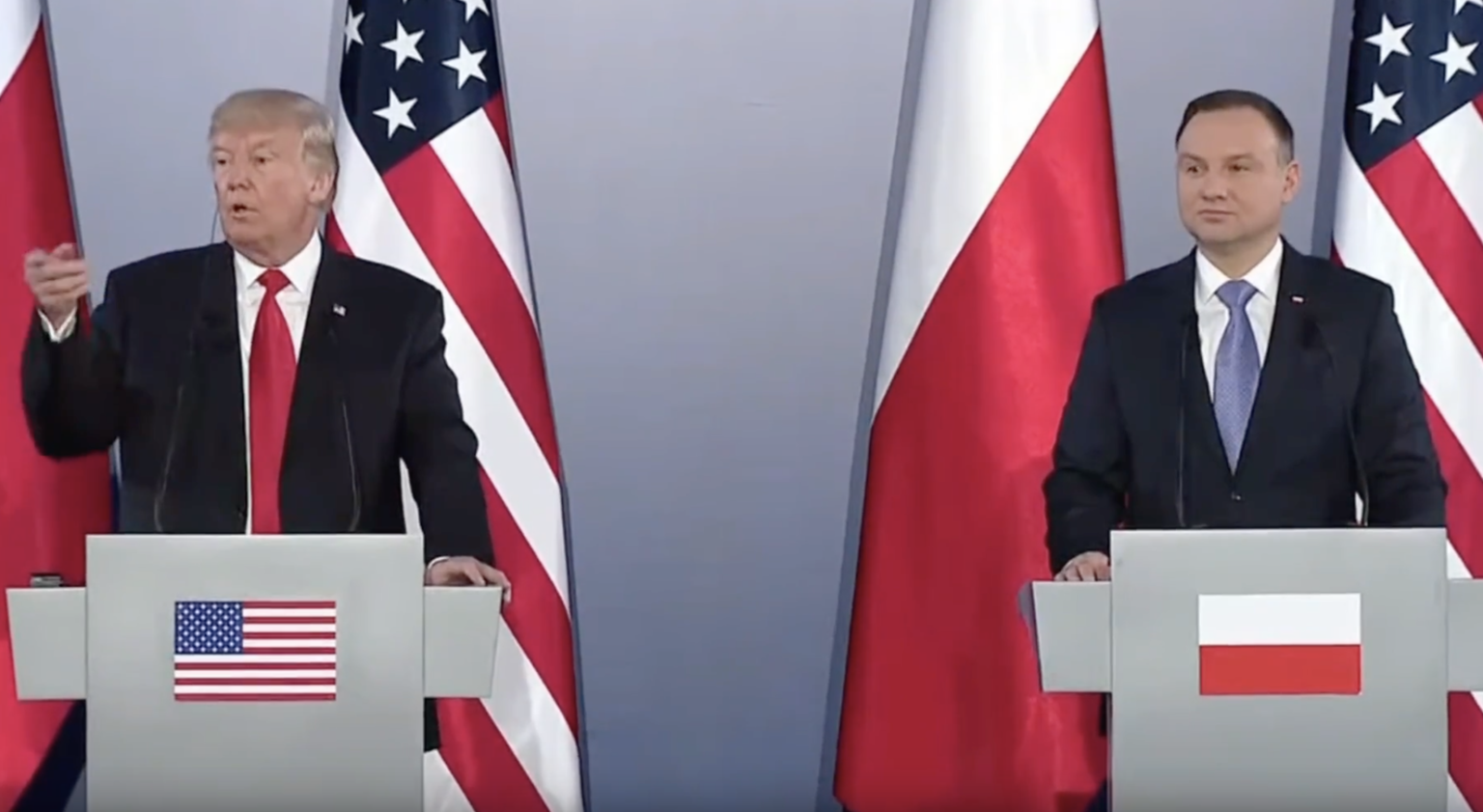During President Donald Trump’s recent visit to Poland, he got a lesson in the reality of the global oil and gas market from Polish President Andrzej Duda. In his prepared remarks, Trump addressed the issue of U.S. oil and gas exports, saying, “America stands ready to help Poland and other European nations diversify their energy supplies, so that you can never be held hostage to a single supplier.”
In the question and answer session that followed, Trump exhibited some of his characteristic bravado when he offered to negotiate a liquefied natural gas (LNG) agreement right then and there.
“I think we can enter a contract for LNG within the next 15 minutes,” Trump said. “Do you have anybody available to negotiate? It will take about 15 minutes.”
Which put President Duda in the awkward position of having to explain to the American president how international energy deals actually happen. As The Hill reported, “Duda laughed in response, saying that it is up to private companies in both countries, not the presidents, to negotiate such a deal.”
In doing so, Trump also unwittingly revealed that one of the main arguments for lifting the long-time U.S. ban on crude oil exports — that crude oil exports would help our allies and improve national security — is fundamentally flawed. The oil and gas exported from the U.S. goes wherever the multi-national corporations and commodity traders want them to go. Those decisions inevitably are based on profits and other priorities for those companies, rather than the national security interests of the nations in which the companies operate.
In fact, the former CEO and chairman of ExxonMobil Lee Raymond couldn’t have been more clear on this issue when, in Steve Coll’s 2012 book Private Empire: ExxonMobil and American Power, he reportedly said: “I’m not a U.S. company, and I don’t make decisions based on what’s good for the U.S.”
Tillerson, Russia, China, and National Security
However, Secretary of State Rex Tillerson, as the previous head of ExxonMobil, should understand the economics of the global oil and gas markets. And his comments and actions have already shown how disingenuous it is to argue that U.S. oil and gas exports are somehow related to national security.
Trump’s remarks about European nations not being “held hostage” to a single supplier were a reference to Russia, a major supplier of natural gas to Europe. The region imports 35 percent of its gas from Russia. But, if the price is right, corporations in European countries will continue to buy Russian gas, despite the geopolitics.
Last month Foreign Policy reported that an official in Tillerson’s State Department said, “It’s not practical to say Russia is going to be replaced as a supplier.” What may not be “practical” still makes a great talking point for the politicians looking to help oil and gas corporations.
Also of note is the fact that Tillerson has a long history of working with Russia during his time at ExxonMobil — a company that actually leases more land in Russia than in America. A big part of Tillerson’s former job was to help Russian companies produce more oil and gas, which they could sell on the global markets.
And it isn’t just Russia that reveals the deception about oil and gas exports and national security. One of the first things Tillerson did in his new job as Secretary of State was threaten China over oil in the South China Sea, leading to headlines like “Is Tillerson Willing to Go to War Over the South China Sea?” As Foreign Policy reported on the reactions to Tillerson’s comments: “The jaws of the Asia policy-watching community hit the floor.”
If national security interests ruled the destination of oil and gas exports, and given the Secretary of State’s stance on China and oil in the South China Sea, then the U.S. wouldn’t be exporting oil to China. And during the many hearings in Congress pushing to reverse the ban on crude oil exports, oil industry titans like Continental Resources CEO Harold Hamm assured Congress that they didn’t expect oil to be exported to China.
Yet, in reality, China is one of the top destinations for U.S. crude oil exports — because these decisions are being made by commodity traders who first and foremost base them on oil and gas company profits.
Iran, Venezuela, and the ‘Allies’ Myth
Harold Hamm also made the argument in his Congressional testimony that the U.S. government needed to lift the 40-year-long crude oil export ban so that our allies, such as South Korea, wouldn’t be forced to buy oil from Iran. This is despite the fact that, once sanctions were lifted on Iran, corporations around the world were lining up to import Iranian oil.
So, now that the U.S. is exporting record amounts of crude oil, has South Korea stopped buying Iranian crude? Not exactly, Reuters reports:
“South Korea, one of Iran’s major Asian customers, took in 8.12 million tonnes of its crude, or 394,324 bpd [barrels per day], over the January-May period. That was up nearly 60 percent from 5.08 million tonnes at the same time last year.”
Perhaps the most glaring example of the farce that U.S. oil exports improve national security is Venezuela. In 2015 the Obama administration declared Venezuela to be a “national security threat.” And yet Venezuela is one of the top destinations for U.S. crude oil exports. Its state-owned refinery on the island of Curacao was second behind Canada as an export destination in 2016.
The National Security Myth
Clearly in today’s world, arguments for improved national security are a winner for those in Congress, which is likely why it was one of the main arguments for lifting the crude oil export ban. Senator Lisa Murkowski (R-AK) was an early champion of lifting the ban and repeatedly used the national security argument, saying, “The national security side of the equation will be an extremely important part of this conversation going forward.” She even used this claim to call out the Obama administration, despite that administration’s pro-oil industry actions.
“It is unfortunate that the White House fails to understand the national security and geopolitical benefits of lifting the ban on oil exports,” Murkowski said.
But while a winning argument, this idea has no basis in reality, as the Polish president recently explained to President Trump.
Yet the real reason the oil industry wanted to export crude was explained clearly by Ron Ness, the president of the North Dakota Petroleum Council:
“It’s a big deal. Once you get a barrel to sea, it will fetch a better price.”
Main image: Trump-Duda Joint Press Conference Credit: Whitehouse.gov
Subscribe to our newsletter
Stay up to date with DeSmog news and alerts







